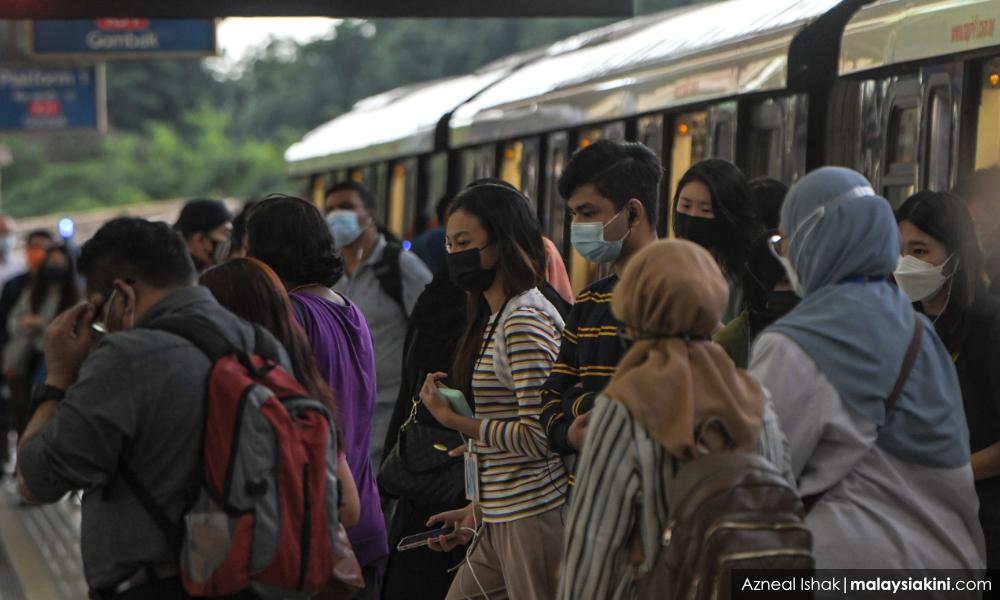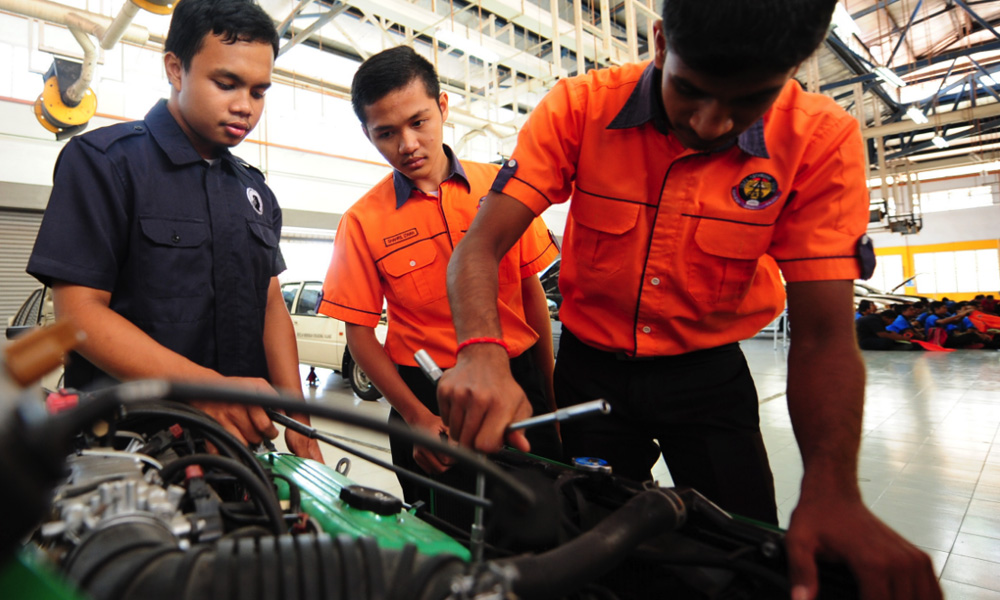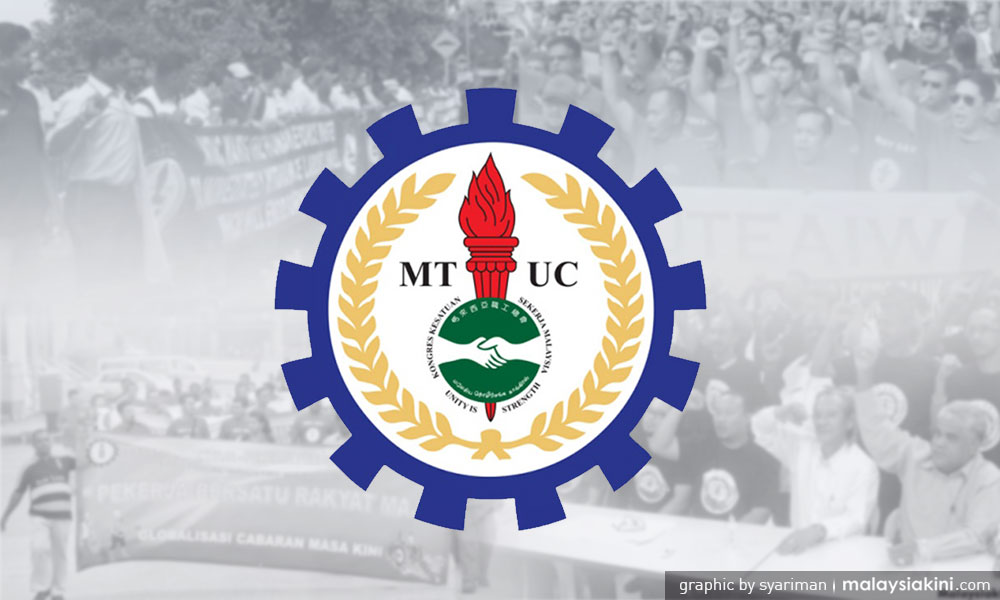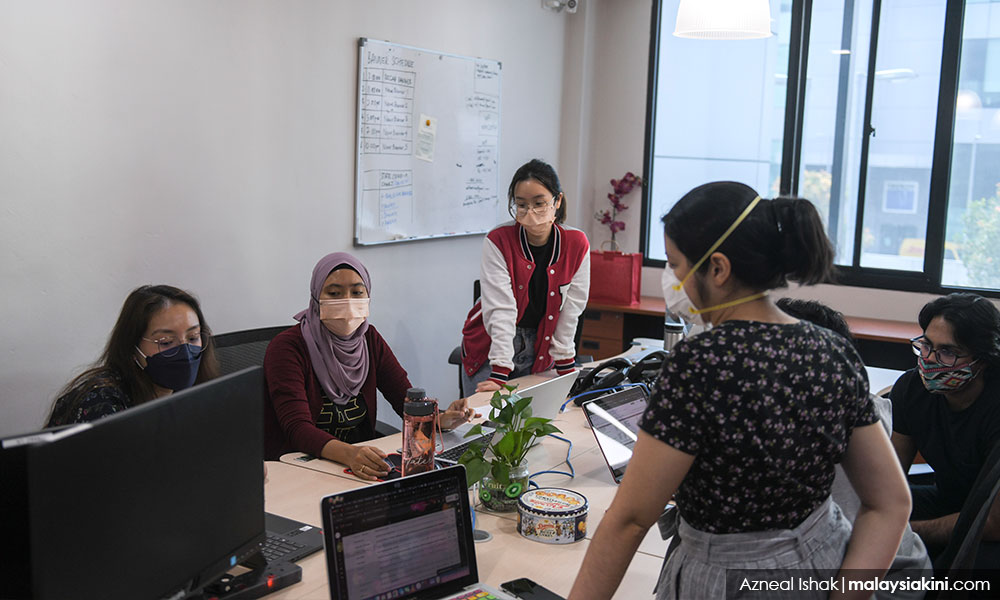At last, the hurdles and strategies of the British colonial government to weaken workers and trade union movement is being dismantled..
Today, only about 3-4% of workers in the private sector are members of the Trade Unions... The fault lies in 'bad laws', trade union leaders/attitude, and most importantly workers - who do not see the importance of workers coming together to find for better worker rights against employers, or against the government for better laws that will promote and protect worker rights...
See below an article worth reading - Bringing democracy into the labour movement
Will Malaysia address some fundamental problems?
REGULAR employment until retirement/retrenchment - It is absurd when Malaysian workers are employed on short-term contracts, usually 1 year - and then their contracts are not renewed even though the work requiring workers still exist. The employer then employs another worker on another short-term contract. If the Malaysian government creates a law abolishing such employment practice to insist that all workers are employed as regular employees who are terminated on retirement, or who are retrench when there truly is no more need for the worker to do that work in the business - it is so much more just. The employment laws provide for increase of wages, rights, etc... the longer the worker works, and now workers of short-term contract do not benefit or get all these rights. If a worker is employed for more than a year, he/she on termination/retrenchment entitled to get termination/retrenchment benefits. Now, a short-term contract employee really may have no time to form a trade union, or fight for better rights for after all loss of job happens in a year or less.
DIRECT EMPLOYMENT - Many businesses do not make workers their Employees. The use 3rd party supplied workers, who legally are not the employee of the workplace. Hence no employer-employee relationship with these supplied workers, and so these 'supplied' or 'outsourced; workers do not have rights to demand better work benefits or working conditions from the workplace owner/principal. The Minister can simply order that all workers are EMPLOYEES of the place at which they work - but Anwar Ibrahim's government has still not done this... see Some workers are not EMPLOYEE of the Workplace - hence no employee rights against workplace operators - Will PM Anwar Ibrahim to protect worker rights - make sure all workers are EMPLOYEES at the place they work with a 'Contract of Service'? ?
SHOULD MALAYSIAN WORKERS REJECT GOVERNMENT THAT DOES NOT CARE ABOUT THEIR RIGHTS AND WELLBEING?
This Anwar Ibrahim led PH government, just like the former BN regime seem only concerned about public sector employees(Penjawat Awam) but not the rest of Malaysian workers. Yes, the government contract doctor issue was addressed making them permanent employees - but the private sector contract employees still not made permanent employees?
See some earlier posts:-
The state of the labour movement in Malaysia (Part 1)
The origins of the labour movement in M’sia (Part 2 of a series)
How the British suppressed the Malayan labour movement (Part 3)
The last breath of the labour movement?(Part 4)
93 Groups:- Abolish the ‘Contractor for Labour’ system Withdraw the 2012 amendments to Employment Act 1955.
93 - Mansuhkan Sistem ‘Contractor for Labour’ Tarikbalik pindaan 2012 kepada Akta Kerja 1955.

LETTER | On Oct 10, 2023, Dewan Rakyat passed the Trade Union (Amendment) Bill after the third reading, dismantling draconian provisions enacted in the British colonial period, which forcefully split trade unions into small pieces according to particular trade, occupation and industry.
But just how small are the Malaysian trade unions?
According to the statistics of the Trade Union Affairs Department (JHEKS), there are 197 trade unions in manufacturing sectors in 2022. The total membership of all manufacturing sector unions is 98,282.
On average, each union has 499 members. If we minus several big national unions with thousands of members, probably most of the 197 manufacturing sector unions have less than 100 members. Many of them would be in-house unions.
Various government measures were taken to weaken the bigger national unions horizontally. For instance, the Electronics Industry Employees’ Union (EIEU) are arbitrarily separated from the Electrical Industry Workers’ Union (EIWU).
The Non-Metallic Mineral Products Manufacturing Employees’ Union (NMNPMEU) cannot be merged with the Metal Industry Employees’ Union (MIEU).
When the Paper and Paper Products Manufacturing Employees’ Union (PPPMEU) organises a packaging materials company, the company said the union is not qualified to represent the works because its products cover non-paper products such as aluminium and laminated film.
After 10 years of complaints, JHEKS remains ambiguous on the competency of PPPMEU to represent workers in the company.
Worse still, the Human Resources Ministry’s policy restricts some industrial unions to register by regions or states. The EIEU were asked to register as northern, southern, eastern and western region unions. The garment and textile unions were registered by states.
Section 9 of the Industrial Relations Act prohibits a workers’ union from seeking recognition for workers with the capacity of executive, managerial, confidential and security, again segregating trade unions vertically.
For example, the National Union of Bank Employees (Nube) can only represent clerical workers and similar capacities.
In 1981, the Registrar of Trade Unions decided that bank officers could not join Nube, which is the legal restriction that led to the formation of the Association of Bank Officers Peninsular Malaysia (Abom), covering non-executive bank officers.
As a result of these anti-labour legislations, collective bargaining is ineffective in raising real wages because it severely disadvantages trade unions.
Silenced voices
Since capital owners can freely venture into multi-sector businesses and merge with each other whenever it is needed, this creates an asymmetry of power between capital and labour.
The phenomenon of low-wage workers has a strong correlation with restrictive labour laws and weak trade union movement, but many policymakers choose to ignore the factor and rely on the minimum wage as the only available policy tool.
The “union-apartheid” policy that divides trade unions horizontally and vertically ensures the perpetuation of the atomisation of Malaysian trade unions.
In addition, the criminalisation of solidarity strikes by students (Section 38) and workers of other establishments (Section 45) in the Industrial Relations Act 1967 effectively isolates trade unions from any external support.
Thus, workers in Malaysia are atomised so that any resistance can be crushed by the state or employers immediately.

The true meaning of freedom of association is that workers have the right to choose a worker organisation of their own choice. The principle is implemented all over the world with the exception of dozens of authoritarian governments.
This is a game-changer for trade unions to grow stronger by uniting workers in a few big unions. The increase of union strength on bargaining tables will help workers obtain higher wages and better benefits.
It is surprising to observe certain trade unions’ views on the Trade Union (Amendment) Bill are extremely parochial, focusing only on the amendment of Section 12(2) that removes the director-general’s discretionary power to reject the registration of the second or more unions at a workplace.
The argument against freedom of association is grounded on a few assumptions: (1) The reform will lead to competition among unions and destroy the unity of workers; (2) Employers will abuse the law to set up yellow unions; (3) The existence of multiple trade unions will weaken workers’ bargaining strength; (4) Weakened bargaining power will lead to lower wages and violation of workers’ rights.
Nine suggestions
With due respect, let me answer the above assumptions one by one: First, the argument for monopoly and against competition is contrary to people’s common sense.
Would we agree with the monopoly of a mini market or restaurant in our residential area that gives consumers no choice? Would we agree that the government should ban the registration of more than one welfare organisation in our society?
Free competition ensures businesses serve consumers the best prevails. Similarly, trade unions that serve workers the best will be wholeheartedly supported by workers in Malaysia.
True unionists embracing democracy have nothing to fear because they are confident to win over workers by giving the best service, training and advocacy.

Second, it is high time to change the culture of authoritarianism and top-down approach in the trade union community. Progressive unionists should bring democracy and professionalism to the Malaysian labour movement.
Millions of unorganised workers should be given a voice to change their poor working conditions.
Under the circumstance that workers have no “voice” representation, disappointed union members will choose to “exit” quietly, this undermines the union’s credibility.
Union democracy means giving more power to workers, allowing them to make choices, respecting the wisdom of the masses and seeing power transition through triennial delegate conferences as normal.
Trade union officials must regularly communicate with the members and fulfil their needs. It should not be the otherwise that union members are asked to give unquestionable support and surrender all decisions to the leadership.
Third, the opposition to freedom of association is in contradiction with the spirit of the Malaysian democratic system that allows multiple political parties, NGOs, and business entities to co-exist peacefully in Malaysia.
However, Article 10(3) of the Federal Constitution confers the power to the government to restrict freedom of association in laws relating to labour and education.
This outdated article should be abolished after the passage of the Bill. In fact, we can say that the trade union movement is the sphere subject to the least democratic rule in Malaysia.
Fourth, if Malaysian citizens can exercise their democratic rights during the general election and choose the best party to serve their interests, why can’t we trust workers to use their wisdom to choose the best unions that serve them?
Why is it a double standard when it comes to trade union membership?
When some unions are stoking fear among unionists, presuming workers will use freedom to split workers rather than unite the workers, such argument shows complete distrust of union leaders on the wisdom and capability of their rank and file members to practice democracy at the workplace or industry level.
This mirrors government paternalism where the political elites know the best for rakyat. Without strongman leadership, the country will descend into chaos.
In the 21st-century Malaysia which witnessed the democratic transition and people’s eagerness for change, trade unions must decisively abandon narrow paternalism.

Fifth, trade unions should go through a decolonisation process to liberate themselves from the invisible cage constructed by the British colonial regime 80 years ago.
The leadership of the Malaysian Trades Union Congress (MTUC) leaders should also take steps to register as a federation of trade unions under Section 73 of the Trade Union Act 1959.
Sixth, the compulsory unification of trade unions is not supported by the International Labour Organisation.
Independent and democratic unions should never agree with state-sponsored unitarian union structure. It is the responsibility of trade unions to educate workers on the importance of unity to assert its collective strength.
Trade unions can no longer shift the responsibility to the government. The unions must invest in education and organising, the union officials must be accountable for any decision made by them and be appraised by members periodically.
Seventh, with or without labour law reform, yellow unions are widely used by employers to deter the organising effort of national unions.
Under the existing Trade Union Act, as soon as employers form a yellow union, it will monopolise the workplace and cut the other national unions from the workers.
After the amendment, national unions could still set up their unions and gradually win over the workers.
The opponents of freedom of association failed to see the advantage of the amendment because they have neither strategy nor tactics in organising, which is the lifeline of trade unions.
Eighth, it is flawed to argue that competition among trade unions will weaken the bargaining strength. The Industrial Relations (Amendment) Bill 2019 inserted a procedure for determining sole bargaining agents.
In the event that more than one union exists in a workplace, the union commands the majority in the secret ballot will be authorised to initiate collective bargaining with the employer.
It is normal in democratic countries that a majority union negotiates with minority unions and includes their demands in collective bargaining.
Sometimes, several trade unions will form a coalition to bargain collectively with the employer.
If political parties can find a way to resolve their difference and bring stability to the country, so can the trade unions.
Ninth, academic research suggested that a unionised workplace provides higher wages and better benefits than a non-unionised workplace.

Thus, the implementation of freedom of association will precipitate the mushrooming of trade unions and increase workers’ wages and benefits, particularly in workplaces where 94 percent of Malaysian workers are non-unionised.
The preoccupation with the “inter-union rivalry” of the six percent unionised workers is strange and over-exaggerated.
Competition among unions will lead to a situation where unions promise higher wages and actively campaign against violation of workers’ rights, unions that cannot perform will automatically be abandoned by workers.
Competition makes unions more aggressive, productive, capable to deliver higher wages and protect workers’ rights. Thus, the proposition of weakened bargaining power leads to lower wages and violation of workers’ rights does not hold water.
In conclusion, government leaders are trying their best to adapt to the rapidly changing political scenario against the background of the rise of social media and digitalisation, where people are given more voices and demanding change.
Draconian laws such as the International Security Act 1960 were abolished, the Peaceful Assembly Act 2012 was enacted and alternative information is now abundant on internet.
In the interest of Malaysian workers, the labour movement must embrace democratisation through the implementation of freedom of association embedded in the Trade Union (Amendment) Bill.
Perpetuation of the culture of authoritarianism in the labour movement goes against the tide of social change. Reluctance to accept change and failure to meet the expectations of the younger generation may see trade unions become increasingly irrelevant and risk being replaced by other types of labour organisations.
Lastly, there is no doubt the Bill is not perfect legislation, some shortcomings still need to be addressed. But Rome was not built in a day.
The labour movement must identify the priority and select the battlefield strategically. We must be confident that we will come back stronger and demand more reforms in the next few years.
NG YAP HWA is the assistant secretary of the Labour Solidarity and Learning Resource Association (LLRC). - Malaysiakini, 1/11/2023





No comments:
Post a Comment